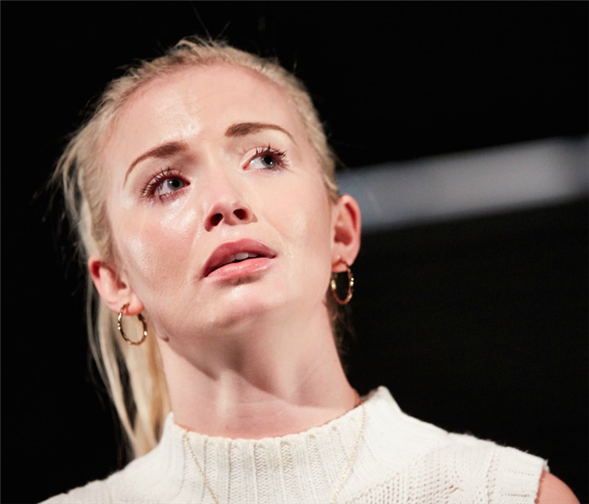Translate Page

Why director Rachel O'Riordan took a physical approach to Iphigenia in Splott
---
At times, the solo show genre can feel old hat. Yet every now and then, a director comes along with a knack for slapping it back to life -- and the audience with it. Rachel O'Riordan's staging of Gary Owen's one-hander Iphigenia in Splott is a jolting example. The story of a young downtrodden woman's sacrifice, it premiered last year at the Sherman Theatre in Cardiff, Wales where it garnered awards and wide acclaim. Now O'Riordan, the company's Irish artistic director, has imported this searing play stateside as part of the annual Brits Off Broadway lineup at 59E59.
When it comes to "one-ers," as O'Riordan calls them, Iphigenia in Splott is not her first time at the rodeo. As a veteran director of solo performance, she always begins by thinking about physical expression. O'Riordan happens to have a background in dance, as does the actress, Sophie Melville, who plays the lone character, Effie. "I take a physical approach, which helps me understand the pulse and the pacing of a script," O'Riordan says. "I think that's the dance thing."
O'Riordan's not a fan of the stand-and-speak approach to monologues. "When I direct, I start by imagining what it feels like to be in the character's body," she says. For this director, the script is only half of the play. The other half comes from the actor's raw energy, which O'Riordan then sculpts into a meticulously detailed sequence of ecstatic movements. She admits she obsesses over the tiniest details. "I like to use the body as a storytelling tool, so everything is choreographed," she says. "This helps the actor to not get lost. In a monodrama, if the actor gets lost, the play's gone."
{Image1}
To perform an entire play solo is akin to an Olympic feat, especially with O'Riordan at the helm. Movement is woven throughout the 80-minute monologue to sustain the audience's attention. "When theatre lacks athleticism…I get bored!" O'Riordan says. Even in moments of silence and stillness, Melville's body seems always alert, ready to unleash the next torrent of Effie's spitfire soul. "Effie is an archetypal chaff," O'Riodan adds. "One may not have ever heard of a place called Splott, but we all know an Effie. Effie is a goddess living in a gutter."
The word "goddess" is on point since Effie's character is loosely inspired by the Greek myth of Iphigenia, who was sacrificed by her father, King Agamemnon, to goddess Artemis so that his fleet could sail safely to Troy. Effie's self-sacrifice is not arcane. "Effie doesn't work; she has no stake in society; she doesn't care," O'Riordan says. "Effie is lazy. But underpinning all of that is an extraordinary intelligence." O'Riordan points out that there are Effies all around us, all the time. And yet we seldom care enough to look. "In this world, there are people who are very intelligent, much more intelligent than me," O'Riordan admits. "But we may never find out, because the circumstances into which they were born preclude any success." Therefore, Iphigenia in Splott is not just about Effie. "It's about us: the people in the room. It feels like a slap in the face."
---
Ned Moore is a dramaturg and theatre writer. Follow him at @nedmooretheatre. Follow TDF at @TDFNYC.
Top image: Sophie Melville. Photos by Mark Douet.
TDF MEMBERS: Browse our discounted tickets for theatre, dance, and concerts.